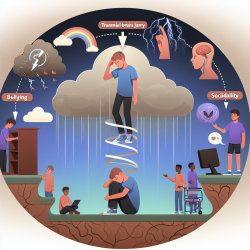Introduction
In the realm of early childhood education, the significance of social skills interventions (SSIs) cannot be overstated. As practitioners, we are often faced with preschoolers exhibiting emotional and behavioral challenges. According to a recent meta-analysis, SSIs have shown moderate effectiveness in addressing these issues, providing a beacon of hope for educators and therapists alike.
Understanding the Research
The meta-analysis, titled A Meta-Analysis of Social Skills Interventions for Preschoolers with or at Risk of Early Emotional and Behavioral Problems, delves into the effectiveness of SSIs across 25 studies involving 3,484 preschoolers. The findings reveal an overall effect size of 0.54, indicating a moderate impact on children's social behaviors. This suggests that SSIs are a viable strategy for practitioners aiming to improve social outcomes in preschool settings.
Key Findings and Practical Implications
- Social-Cognitive Skills and Problem Behaviors: SSIs had a more significant impact on social-cognitive skills and problem behaviors (effect size of 0.54) compared to social competence (effect size of 0.20). This highlights the importance of targeting specific skills for more effective outcomes.
- Curriculum and Integration: Interestingly, interventions without a formal curriculum were found to be more effective. Additionally, SSIs delivered during scheduled times were more impactful than those integrated throughout the day. This insight can guide practitioners in designing more effective intervention schedules.
- Treatment Fidelity: Studies reporting treatment fidelity showed smaller effect sizes. This counterintuitive finding suggests that while fidelity is crucial, the way it is reported or implemented might influence outcomes. Practitioners should ensure fidelity without compromising the adaptability of interventions.
Encouraging Further Research
While the current meta-analysis provides valuable insights, it also highlights areas needing further exploration. For instance, the limited focus on tertiary-tier interventions calls for more research into intensive SSI strategies. Additionally, addressing internalizing behaviors, which are often overlooked, could enhance the comprehensiveness of SSIs.
Conclusion
For practitioners dedicated to fostering positive outcomes in preschoolers, this meta-analysis offers a data-driven foundation for implementing effective SSIs. By focusing on targeted skills and considering the nuances of intervention delivery, educators and therapists can significantly enhance the social and emotional development of young children.
To read the original research paper, please follow this link: A Meta-Analysis of Social Skills Interventions for Preschoolers with or at Risk of Early Emotional and Behavioral Problems.










